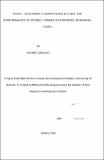Browsing Department of Development Studies by Title
Now showing items 1-7 of 7
-
Elided Populations: A Baseline Survey on Human Trafficking in Kenya
(International Rescue Committee, 2017)Trafficking in persons is a crime. It is gaining momentum in the continent and particularly in Kenya and also attracting the attention of actors who are working to combat it. This focus shows the multiplicity of actors ... -
Governing Emerging Technologies: A Systematic Exploration of Kenya’s Biotechnology and LMO-Specific Policy Documents for Adoption and Implementation of Synthetic Biology
(International Journal of Innovative Science and Research Technology, 2021)As an emerging yet disruptive technology, the most challenging questions surrounding synthetic biology (SynBio) are, arguably, those of regulatory nature. At the global scale, such questions have been framed within ... -
Incoherent policies and contradictory priorities in Kenya
(Refugee Studies Centre, Oxford Department of International Developmen, 2022-09-01)Policies should aim to realise a people or a group’s aspirations. However, in politically complex institutional environments, the design and adoption of policies may lose sight of common goals. Since the 1990s, Kenya ... -
Nile perch market liberalization and chronic poverty: drivers and maintainers of chronic poverty among fishing community in Suba district
(University of Nairobi, 2008)This study is about Nile perch market liberalization and chronic poverty among fishing community in Suba District. It identifies the socio economic characteristic of chronically poor households among Nile perch fisher ... -
One Step Forward, Two Backward—Every Five Years: Electoral Violence and Peacebuilding in Kenya
(Springer International Publishing, 2022-10-27)Over the past twenty years or so, the peacebuilding enterprise has witnessed the development of many frameworks, models, strategies, fundamental assumptions and principles designed to achieve sustainable peace. Peacebuilding ... -
Socio-economic characteristics and the performance of women-owned enterprises in Mumias town
(University of Nairobi, 2003)This study examines how socio-economic characteristics affect the performance of women owned enterprises in Mumias town. This study builds upon the premise that differences in socio- economic characteristics affects ...

